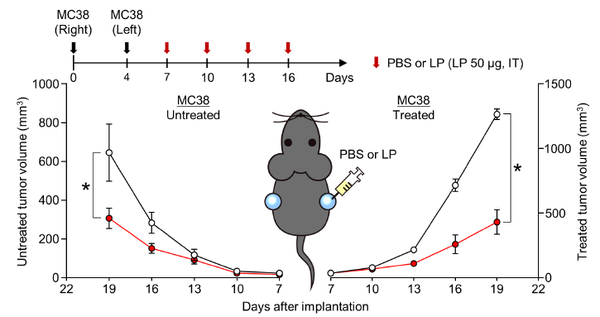CHA Vaccine Institute said Monday it has confirmed the immuno-cancer treatment effect of L-pampo, an immuno-cancer drug candidate that stimulates the toll-like receptor (TLR) signal pathway, developed by the institute independently.

The institute, jointly with Professors Chon Hong-jae and Kim Chan of CHA University Bundang Medical Center, showed that L-pampo induces strong anticancer immune responses and increases the therapeutic effect when combined with immune gate inhibitors.
TLR agonist L-pampo is a complex of TLR2 and TLR3 ligands. When used as a vaccine formulation, L-pampo is an immune enhancer that increases the immune origin of antigens. As an immune anticancer therapeutic agent, it induces the death of cancer cells to create a tumor microenvironment from low immunity to high immunity.
Based on the strong immuno-cancer characteristics of L-pampo, the institute has been exploring the possibility of development as an immuno-cancer drug.
When L-pampo was administered alone to a colorectal cancer mouse model, the tumor size decreased by 57.2 percent in the L-pampo administration group, and CD8+ T cells attacking cancer cells increased by 5.2 times.
Immune gate inhibitors that utilize our body's immune system are not toxic to living cells. They offer better effectiveness and side effects than existing anticancer drugs but have a limited response rate of 30 percent. Thus, L-pampo, PD-1, and CTLA-4 immuno-gate inhibitors were administered together. Eight out of 10 mice in the colon cancer model and nine out of 10 mice in the skin cancer model showed a higher treatment effect or complete tumor loss.
In the colorectal cancer mouse model, L-pampo activated systemic anticancer immune responses, showing 65.9 percent tumor suppression effect compared to 52.5 percent without administration.
The researchers also confirmed that memory T cells for a specific cancer were formed due to the activated immune response, showing a continuous anticancer reaction to the same cancer species, leading to the effect of cancer treatment without resistance.
"This study is encouraging because it shows that our TLR agonist, L-pampo, can be developed as an effective cancer treatment that overcomes the limitations of immune gateway inhibitors," CHA Vaccine Institute CEO Yum Jung-sun said.

